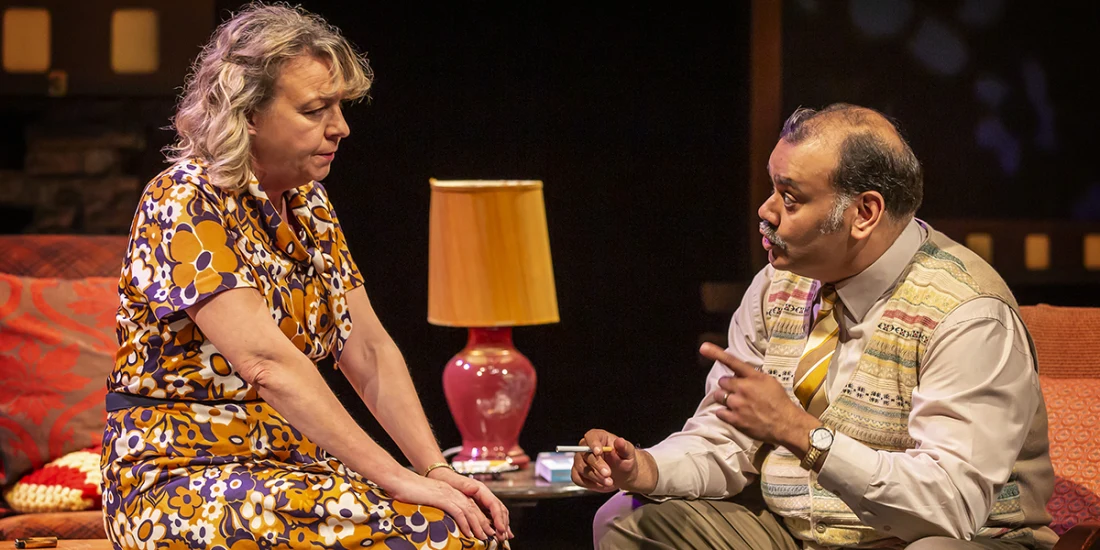'East is East' review - Ayub Khan Din's play continues to resonate 25 years on
How time flies: I remember being at once entranced and moved by East Is East, when Ayub Khan Din's debut play first appeared in 1996 in a 60-seat central London studio space before moving on to two larger London venues and then Leslee Udwin's highly engaging 1999 film. Since then, the same material has never quite landed in the same way, at least for me: a 2014 revival, starring Khan Din himself as the paternal scold at the play's bruising centre, misfired, and so, to a lesser degree, does Iqbal Khan's current 25th-anniversary revival, presented in collaboration with Birmingham Rep. (That's the playhouse, in turn, where the show had its debut.)
In part, the problem may simply have to do with shifting perceptions towards the character of George Khan (played here by Tony Jayawardena), the Pakistani husband of an English wife and father to a stage full of children - sons mostly, but also a daughter - who fear and scorn him in turn. Prone to bouts of violence where others might resort to language, George exists in a tradition dating back, possibly against expectation, to Billy Bigelow in Carousel, and his wife Ella (the excellent Sophie Stanton) is given an empathic speech that recalls Julie Jordan's efforts to make sense of Billy's brutal lapses in the American musical theatre classic.
Last time round, Khan Din so fully inhabited this version of his own father that one wondered why Ella didn't just pack up the kids and move on. Jayawardena, eyes popping, veers more towards the cartoonish, but either way the net result is to forestall much engagement with a crucial dynamic to a play into which Khan Din has written himself: youngest son Sajit (Noah Manzoor), who is only reluctantly separated from the enveloping cocoon of his parka, represents the author's portrait of himself in embryo in a narrative centring around that same character's circumcision on the one hand and the forced marriage that may or may not await two of his older brothers, who needless to say have other ideas as to their future.
The first act in this iteration seems largely to mark time, and isn't helped by a set from Bretta Gerecke whose projections (also by Gerecke, who did the lighting as well) help establish the time and place (1971 Salford) but which nonetheless has the effect of dispersing the action: the sense of community, even potential claustrophobia, is only fleetingly arrived at, and it isn't until the stakes are raised after the interval that the production finds its footing. Happily, the second and longer half ups the ante and allows Stanton's nicely underplayed Ella to suggest a patient heroism not dissimilar to that communicated by the wonderful Linda Bassett first time round. And though Amy-Leigh Hickman is a tad shrill as the lone daughter, Meenah, the sons all leave an impression, from Manzoor's indrawn family chronicler-in-waiting to Gurjeet Singh and Assad Zaman as men determined to carve out a life well apart from that preordained for them by a man who refers rather insolently to their own mum as "my only wife - in England".
Apart from all the "tickle tackle" chat, the play continues to resonate in its depiction, as timely now as then, of a generation caught between cultural cross-currents whereby they are upbraided with the very racial slurs that the English side of them is expected to find funny. The children's heritage does allow for the best joke of the play, which recounts for all in attendance to clock the difference between a half-breed and being inbred. And the fact that Sajit managed to shed his sartorial security blanket and become a major actor and writer posits an implicit happy ending to events that Khan Din doesn't need to write into his play: the fact of the play offers sufficient proof in itself.
Photo credit: Sophie Stanton and Tony Jayawardena in East is East (Photo by Pamela Raith Photography)
Originally published on
